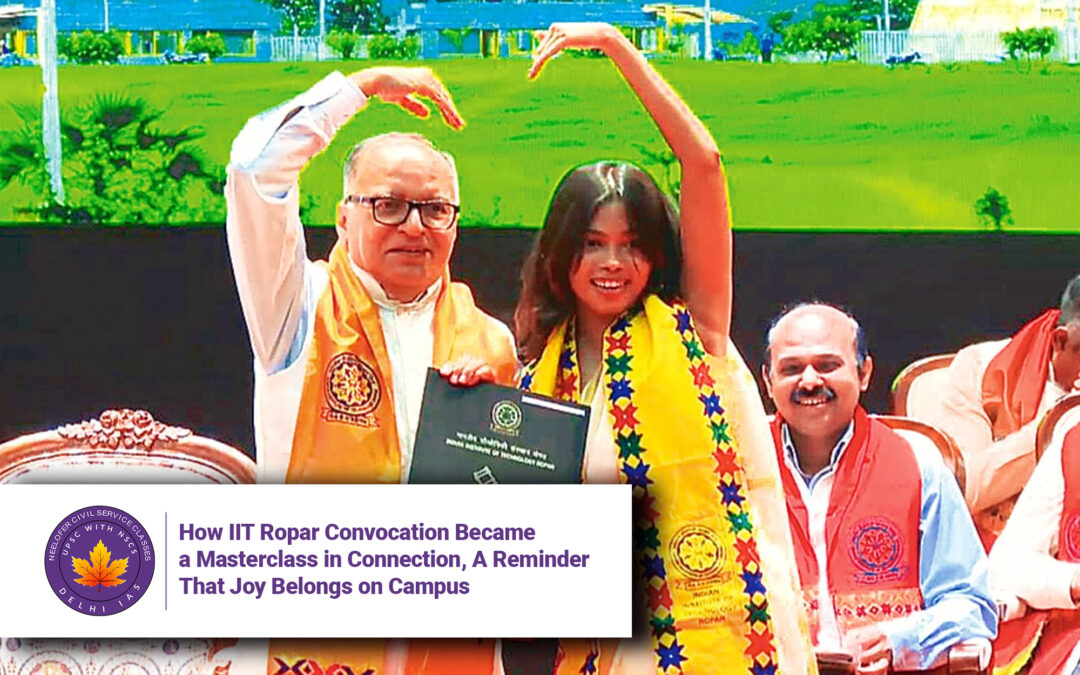How IIT Ropar Convocation Became a Masterclass in Connection, A Reminder That Joy Belongs on Campus
Why in News?
The convocation ceremony of the Indian Institute of Technology (IIT) Ropar recently went viral, clocking over 30 million views on social media. It wasn’t just the degrees or the speeches that caught public attention—it was the infectious, emotionally intelligent presence of the institution’s director, Professor Rajeev Ahuja. From fist bumps to Korean finger hearts, Ahuja’s unique and empathetic approach offered a powerful counterpoint to the often rigid formality of academic events.
Introduction
In a world where educational institutions often represent rigidity, hierarchy, and formal traditions, the IIT-Ropar convocation has shown that joy, emotional intelligence, and human connection can coexist beautifully with academic achievement. Professor Rajeev Ahuja, director of IIT-Ropar and a professor of Computational Materials Science, transformed a routine ceremony into a viral masterclass in empathy, relatability, and leadership. His gestures went far beyond the formal act of conferring degrees—they touched hearts, sparked conversations, and reminded everyone that academia, too, must allow space for humanity and emotion.
Key Issues / Background
-
A Shift from Solemnity to Celebration
Convocations are typically solemn, ceremonial affairs—events where the focus is on tradition, formality, and institutional decorum. While these elements are vital in marking the importance of academic achievements, they often alienate students, particularly in a time where mental health, anxiety, and feelings of isolation are widespread. -
Professor Ahuja’s Refreshing Approach
During the IIT-Ropar convocation, Professor Ahuja broke away from traditional norms. He engaged students not just with words, but through gestures that spoke volumes—dabs, fist bumps, and even Korean finger hearts. These seemingly light-hearted actions reflected a deeper emotional intelligence and presence. He didn’t just preside over the event—he was an active participant, connecting with students at their level. -
The Power of Going Viral
Videos of the event quickly garnered over 30 million views, earning Ahuja the affectionate moniker of “pookie professor.” This nickname became symbolic—not just of a professor with quirky moves, but of someone who understood what it means to be young, nervous, and at a life-changing juncture. -
Generational Bridge
While Professor Ahuja might not possess the Gen Z swagger, his intent and authenticity struck a chord. In a world dominated by visual culture and social media, where gestures are often more powerful than words, his playful moves stood out. More than just entertainment, they symbolized an academic figure who cared enough to meet students where they were emotionally. -
Emotional Intelligence in Higher Education
Higher education in India is often a pressure cooker—filled with exams, deadlines, expectations, and institutional pressure. Amid this, Ahuja’s warmth and emotional engagement was more than symbolic; it was necessary. It highlighted the need for academic leadership that prioritizes connection, well-being, and student empowerment as much as it does performance.
5 Key Takeaways / Observations
-
Redefining Academic Leadership
Professor Ahuja’s actions redefine what academic leadership can look like in the 21st century. Leadership is not only about rules and results—it’s also about recognition, empathy, and making people feel seen and valued. -
Student-Centered Learning Environment
Ahuja’s participation shifted the tone of the convocation from one of hierarchy to inclusion. It acknowledged the students not just as degree-holders, but as young individuals at a significant crossroads in life, needing encouragement, validation, and joy. -
Joy and Ceremony Can Coexist
The event was a reminder that joy doesn’t take away from seriousness—it enhances it. By bringing in playfulness, the ceremony didn’t lose its meaning; instead, it became more memorable, more human, and more impactful. -
Importance of Mental Wellness in Education Spaces
In a system often dominated by stress and academic expectations, the professor’s gesture was a counterweight. It was a small but meaningful act of reassurance for students dealing with uncertainty, anxiety, and future worries. -
A Symbol of the Future of Education
The viral reaction to this convocation hints at a larger public desire for change in education spaces—where leadership is relatable, authority is compassionate, and ceremony makes room for connection.
Challenges and the Way Forward
Despite this heartening moment, higher education still struggles with systemic issues—burnout, lack of emotional support, rigid academic structures, and intense competition. While Professor Ahuja’s actions offered a fresh narrative, replicating this kind of culture shift requires more than just individual effort. Institutions need to:
-
Train leaders in emotional intelligence and student engagement.
-
Create systems where students feel seen beyond their marks and degrees.
-
Balance academic excellence with mental and emotional well-being.
-
Encourage informal, human-centered interactions within formal spaces.
-
Celebrate achievements in a way that affirms individuality and connection.
A single convocation may not change the entire system—but it shows what’s possible. It sets a benchmark that others can follow. Leadership in education must evolve from instructing to inspiring, from commanding to connecting.
Conclusion
The “pookie professor” may have just been having fun, but his gestures carried the weight of a much-needed change in how we approach higher education. The ceremony was about more than handing out degrees; it was about showing up for students in a way that made them feel valued, not just graded. In doing so, Professor Ahuja reminded us that academia is not just about institutions, metrics, and rigor—it’s about people, transitions, and shared humanity. And perhaps, what every student really needs at the end of their academic journey is not just a piece of paper, but a reminder that someone is on their side.
5 Important Q&A
Q1. Who is Professor Rajeev Ahuja, and why did he become popular recently?
A1. Professor Rajeev Ahuja is the director of IIT-Ropar and a professor of Computational Materials Science. He became popular for his emotionally engaging and joyful approach during IIT-Ropar’s convocation, where he used gestures like fist bumps and Korean finger hearts to connect with students. His actions went viral and earned him the nickname “pookie professor.”
Q2. What made the IIT-Ropar convocation ceremony stand out from others?
A2. Unlike most solemn and formal convocations, the IIT-Ropar event was filled with warmth, humor, and emotional connection. Professor Ahuja didn’t just distribute degrees—he made students feel appreciated and seen through playful gestures and active participation. This broke traditional norms and resonated deeply with students and the public.
Q3. What is the significance of the term “pookie professor”?
A3. The term “pookie” is a playful nickname that signifies affection and relatability. By being called “pookie professor,” Professor Ahuja was seen as someone who understood and connected with students on an emotional level, especially during a vulnerable and important moment in their academic lives.
Q4. What broader message does this event send about education and leadership?
A4. The event underscores the importance of emotional intelligence, connection, and student-centric leadership in academic institutions. It challenges the traditional view that education should always be formal and distant, and instead supports a model where empathy and joy play vital roles.
Q5. What changes are needed in the Indian higher education system as highlighted by this event?
A5. The event calls for educational reforms that include mental wellness, human connection, and leadership training in emotional intelligence. It emphasizes that students should be nurtured not just academically but also emotionally, and that institutions should create environments where they can thrive beyond grades and degrees.



